Bearded dragons are omnivores, so it is quite common to see them eat quite a variety of insects in their enclosure. You might have seen your reptile pet eat up a house spider and are wondering whether or not it is safe. So, can bearded dragons eat spiders?
Bearded dragons can eat spiders but only the non-toxic types. You can let your lizard eat house and jumping spiders because they are harmless, but do not provide them as the main meal because they are not very nutritious. Instead, also provide dubia roaches for your bearded dragon.
Can you feed spiders to bearded dragons?
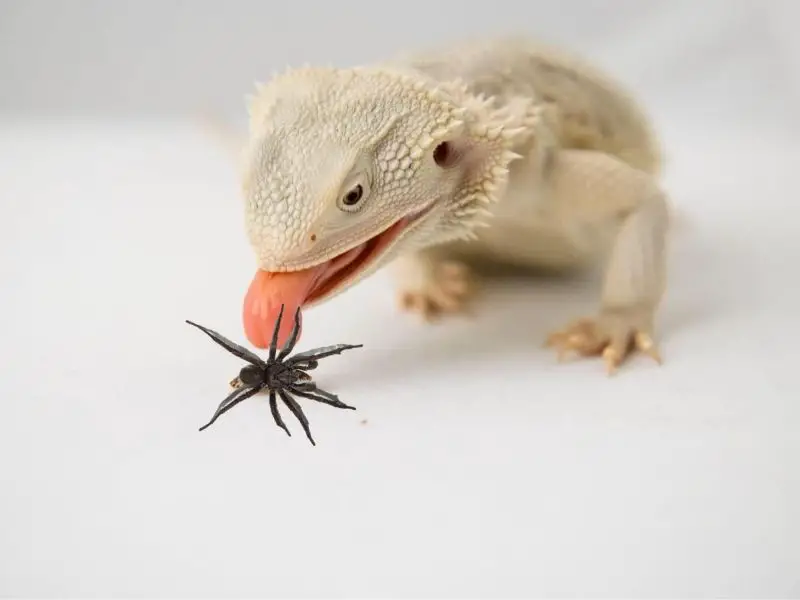
Bearded dragons can feed on spiders, but they are not a good idea for your pet. Spiders make up the majority of prey items in wild bearded dragons’ diets and provide many benefits to their health.
However, when it comes to captive animals like yours, you want to avoid feeding them any kind of arthropods (spiders, beetles, centipedes, scorpions, etc). While you may know a few spiders in your house, it can be risky to feed any of those to your beardie.
Here are reasons why you should not actively feed spiders to your bearded dragon:
- Some spiders are toxic. Their bite can cause paralysis, which can affect your bearded dragon and even cause death.
- Spiders have very little nutritional value compared to mealworms, dubia roaches, and other foods recommended for bearded dragons.
- Spiders and other arthropods can carry parasites and infections, which are risky to your pet’s health.
Note that even the non-toxic spiders are still dangerous to your bearded dragon. They can cause your reptile to have an allergic reaction that could be fatal if left untreated.
What spiders can I feed my bearded dragons?
Although it is not recommended to feed your bearded dragon with spiders, you can allow the pet to eat some types of these arthropods. Spiders have protein content and can help supplement your lizard’s diet, especially if you let the pet roam around your house catching these creatures by itself.
Here are some of the non-poisonous spiders you can let your bearded dragon eat safely:
House spiders
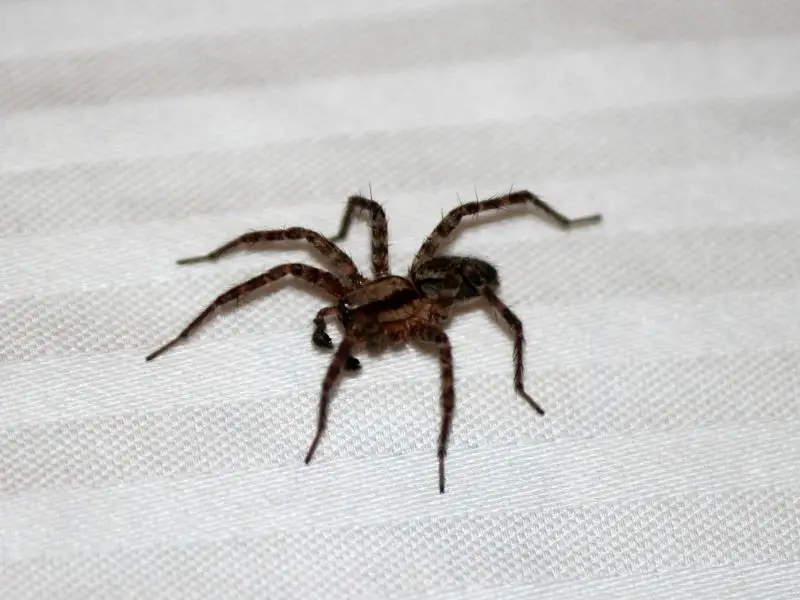
House spiders are generally small and can be found in most homes. They pose no risks to bearded dragons as they do not have a venomous bite.
The female house spiders are about 3/16″-5/8″ in length and have an almost spherical abdomen while the male house spiders are 1/2″-1″ in size. This makes them small enough to feed bearded dragons comfortably without straining their mouths.
The only problem is that house spiders may not be a reliable source of food for your bearded dragon. House spiders can and will eat other parasites that are harmful to lizards such as fleas, ticks, bed bugs, etc, which may make them an unsafe choice if you have any pests in the house.
Therefore, I would recommend going for alternative and healthier foods for bearded dragons such as crickets, mealworms and cockroaches.
Jumping spiders
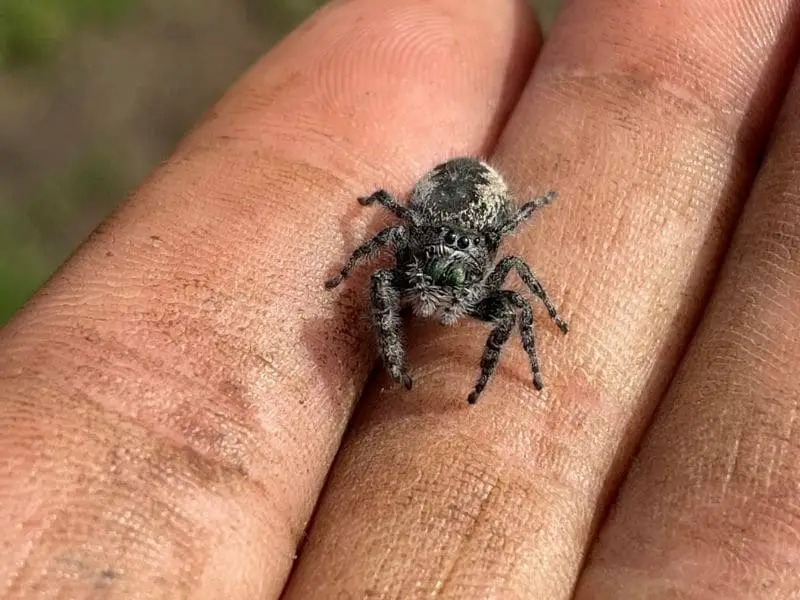
Jumping spiders have fangs, but their bite is not toxic. You can feed your beardie jumping spiders without worrying about them getting sick. However, jumping spiders are not a food that you should feed your beardie every day because there are some side effects to jumping spider bites such as temporary paralysis and muscle spasms, among others.
Even though the spider is tiny, it can still bite your bearded dragon and, in some cases, the bite can pose a risk to the reptile pet.
It is not a good idea to collect jumping spiders actively as food for your lizard. However, if you let the pet roam around in the house, you might find the bearded dragon eating some of those little spiders among other insects.
This should not worry you, but as a precaution, observe the bearded dragon for a few hours just to make sure no allergic reaction or paralysis occurs. In case it happens that the lizard gets paralyzed, take it to a reptile veterinarian as a matter of urgency to prevent severe damage to the nervous system or even death.
Toxic Spiders to NOT Give Your Bearded Dragon
If your house has spider species unknown to you, it is best not to feed them to your bearded dragon. Some species of spiders are poisonous and could make your pet sick or worse, kill it. This is why you should know the types of poisonous spiders that live in your house before feeding one to a bearded dragon.
Here are some venomous spiders you should AVOID feeding your bearded dragon:
Hobo spider
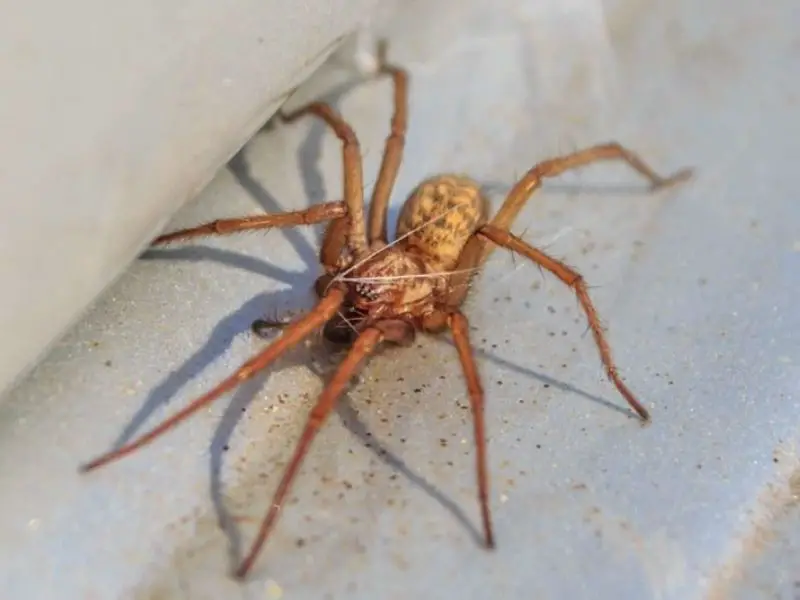
A hobo spider is a poisonous, brown and black colored spider that lives in wooded areas. It has two dark stripes on the dorsal surface of its abdomen. Hobo spiders are also known as aggressive house spiders because they will enter homes during fall looking for shelter before winter sets in.
They usually hide near doors or windows where there may be insects flying into them to eat from nearby plants and flowers.
Hobo spiders are poisonous, meaning they can make your bearded dragon sick if you do feed one to it. Symptoms of intoxication may include vomiting, shaking legs, trembling around the mouth area resulting in drooling, labored breathing which can quickly lead to death.
Brown Recluse
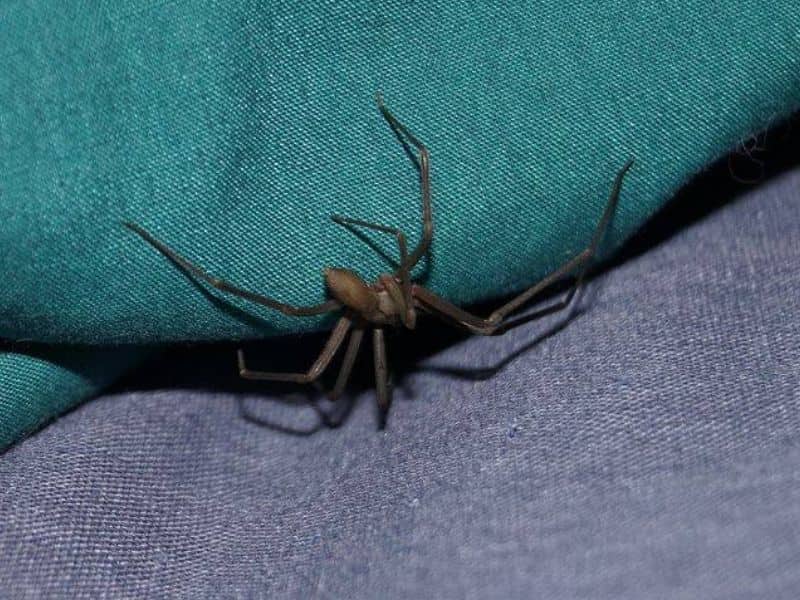
The brown recluse spider is a highly venomous spider found throughout North America. Bites from this species are known to cause skin lesions that may lead to an ulcerative lesion or necrosis. These effects often require medical treatment for humans and pets bitten by the spider, as venom may induce permanent or progressive damage to organs and the nervous system.
Do not feed your bearded dragon or any other reptile pet on brown recluse spiders as this puts them at risk of death.
You can identify the brown recluse spider through its eyes – it has 6 eyes as opposed to the 4 eyes most other species of spiders have.
Yellow Sac Spider
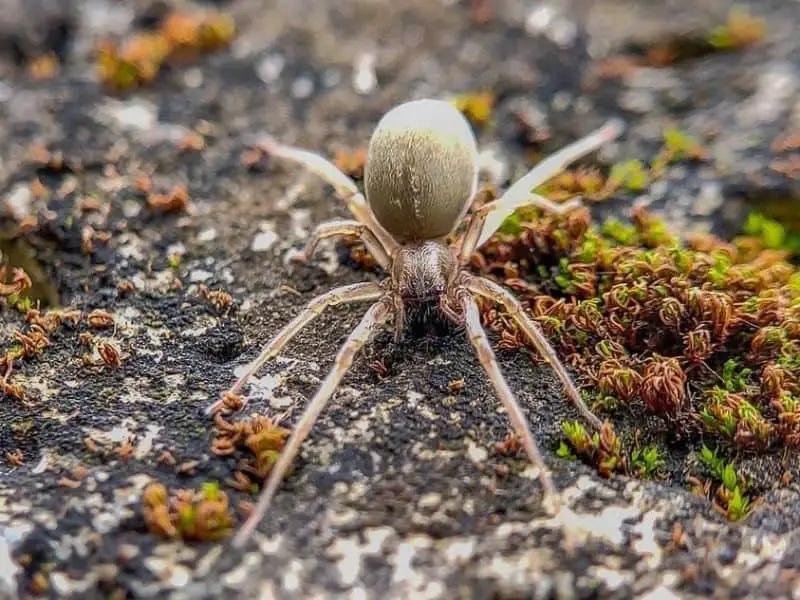
The yellow sac spider is a venomous species of spider found in the United States. The yellow sac’s bite can be dangerous for humans and pets including bearded dragons.
Symptoms of its bite may include cramps, labored breathing, and eventual death. If you see any yellow sac spiders in your home it is important that you remove them promptly before your bearded dragon attempts to eat them.
Wolf spider
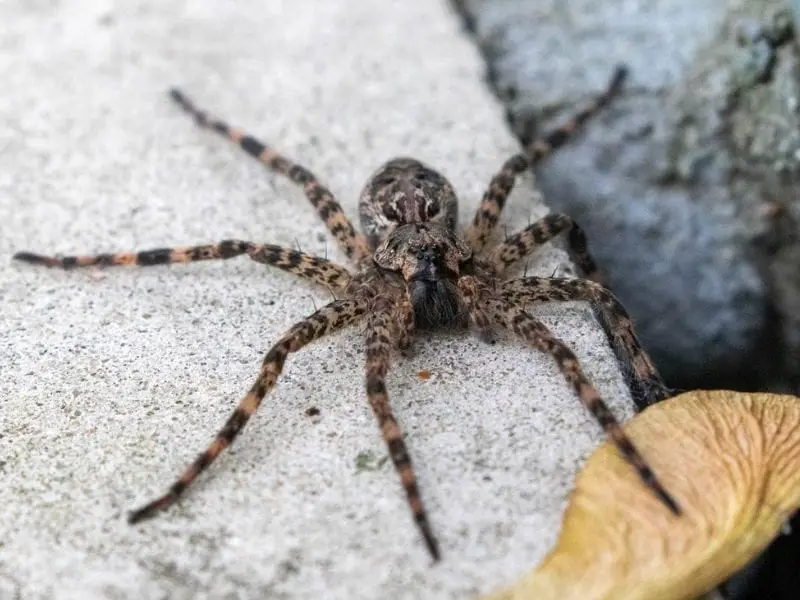
A wolf spider can be identified by its large eyes with eight lenses without pupils and two rows of multiple short hairs on its body. Wolf spiders vary greatly in size depending on where they live but all will be hairy with big eyes.
Wolf spiders can be dangerous to humans and animals. Some wolf spider bites may result in a small amount of redness or irritation at the site but they are typically not harmful; however, some species can cause more severe reactions such as respiratory attacks, nausea, cramps and labored breathing which could lead to death if untreated.
I would not recommend you feed your bearded dragons on wolf spiders as this can lead to poisoning that will put your pet at risk.
Black widow spider
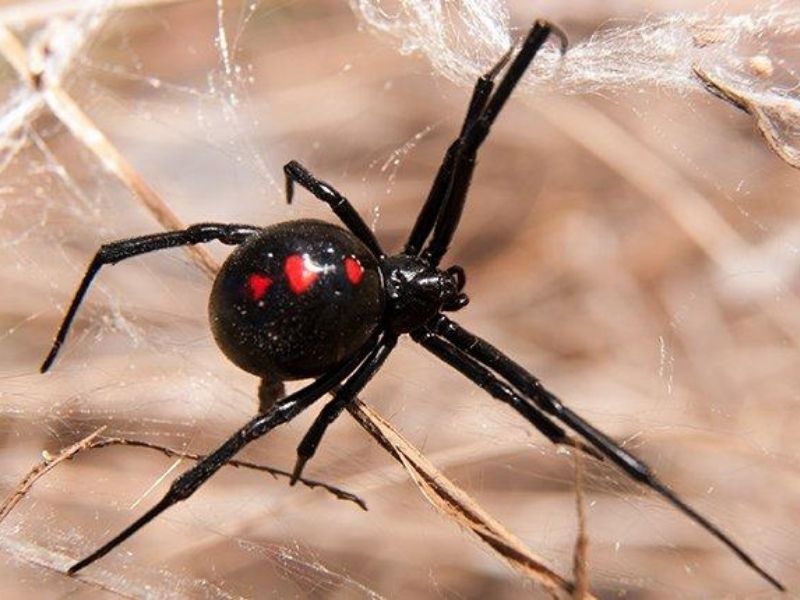
Another dangerous spider you should not feed your bearded dragon is the black widow spider. It is black with a red hourglass shape on its belly. This spider is venomous and has long, powerful legs that can trap reluctant prey in their webs. The black widow’s bite will be painful at first but will eventually turn numb after several hours.
If you see your bearded dragon eating the black widow spider, take it to the nearest reptile vet to prevent severe symptoms.
Alternative Foods For Bearded Dragons
Instead of feeding your bearded dragons on spiders, it is a good idea to go with healthy, more nutritious food options. But what are the best foods for these lizards?
Here are some great food options for beardies:
- Mealworms: bearded dragons love mealworms, which are a fun and healthy treat.
- Crickets: these insects contain more protein than meal worms, so they make for a great snack or part of the diet – as long as you’re careful not to feed them too many because crickets can have lots of calcium in their shells.
- Dubia roaches: bearded dragons love dubia roaches, which contain a lot of protein and dietary fiber.
- Greens (vegetables): bearded dragons need to eat greens for calcium and other vitamins as they grow. Arugula, collards, turnip tops, dandelion leaves, cactus, and broccoli spears are great options.
- Wax worms: these are also a great alternative to spiders, as they contain fats, protein, and moisture..
- Mealworms: bearded dragons love mealworms, which contain protein and are low in fat. They can be offered to bearded dragons as a part of the diet or as a treat.
Having had bearded dragons as pets for over 4 years, I’ve never seen the need to feed these lizards on spiders. The risk is just too much, and the reward too little. I wouldn’t advise anyone to feed their bearded dragons on spiders, even though you might find them eating a few of the spiders in your house.

